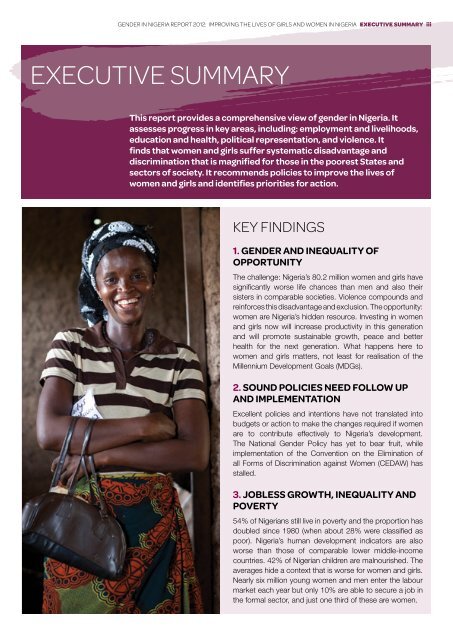Gender in niGeria report 2012 - Economic Commission for Africa
Gender in niGeria report 2012 - Economic Commission for Africa
Gender in niGeria report 2012 - Economic Commission for Africa
You also want an ePaper? Increase the reach of your titles
YUMPU automatically turns print PDFs into web optimized ePapers that Google loves.
<strong>Gender</strong> <strong>in</strong> Nigeria Report <strong>2012</strong>: Improv<strong>in</strong>g the Lives of Girls and Women <strong>in</strong> Nigeria executive summary iii<br />
EXECUTIVE SUMMARY<br />
This <strong>report</strong> provides a comprehensive view of gender <strong>in</strong> Nigeria. It<br />
assesses progress <strong>in</strong> key areas, <strong>in</strong>clud<strong>in</strong>g: employment and livelihoods,<br />
education and health, political representation, and violence. It<br />
f<strong>in</strong>ds that women and girls suffer systematic disadvantage and<br />
discrim<strong>in</strong>ation that is magnified <strong>for</strong> those <strong>in</strong> the poorest States and<br />
sectors of society. It recommends policies to improve the lives of<br />
women and girls and identifies priorities <strong>for</strong> action.<br />
Key f<strong>in</strong>d<strong>in</strong>gs<br />
1. <strong>Gender</strong> and <strong>in</strong>equality of<br />
opportunity<br />
The challenge: Nigeria’s 80.2 million women and girls have<br />
significantly worse life chances than men and also their<br />
sisters <strong>in</strong> comparable societies. Violence compounds and<br />
re<strong>in</strong><strong>for</strong>ces this disadvantage and exclusion. The opportunity:<br />
women are Nigeria’s hidden resource. Invest<strong>in</strong>g <strong>in</strong> women<br />
and girls now will <strong>in</strong>crease productivity <strong>in</strong> this generation<br />
and will promote susta<strong>in</strong>able growth, peace and better<br />
health <strong>for</strong> the next generation. What happens here to<br />
women and girls matters, not least <strong>for</strong> realisation of the<br />
Millennium Development Goals (MDGs).<br />
2. Sound policies need follow up<br />
and implementation<br />
Excellent policies and <strong>in</strong>tentions have not translated <strong>in</strong>to<br />
budgets or action to make the changes required if women<br />
are to contribute effectively to Nigeria’s development.<br />
The National <strong>Gender</strong> Policy has yet to bear fruit, while<br />
implementation of the Convention on the Elim<strong>in</strong>ation of<br />
all Forms of Discrim<strong>in</strong>ation aga<strong>in</strong>st Women (CEDAW) has<br />
stalled.<br />
3. Jobless growth, <strong>in</strong>equality and<br />
poverty<br />
54% of Nigerians still live <strong>in</strong> poverty and the proportion has<br />
doubled s<strong>in</strong>ce 1980 (when about 28% were classified as<br />
poor). Nigeria’s human development <strong>in</strong>dicators are also<br />
worse than those of comparable lower middle-<strong>in</strong>come<br />
countries. 42% of Nigerian children are malnourished. The<br />
averages hide a context that is worse <strong>for</strong> women and girls.<br />
Nearly six million young women and men enter the labour<br />
market each year but only 10% are able to secure a job <strong>in</strong><br />
the <strong>for</strong>mal sector, and just one third of these are women.

















